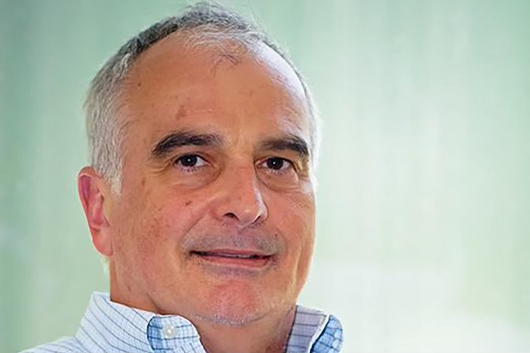Fred Joutz, an economics professor and the former co-director of a research program focused on forecasting economic trends, died from cancer last month after more than 30 years at GW. He was 68.
Joutz started teaching at the University in 1988 and became the co-director for the H.O. Stekler Research Program on Forecasting in 2000, where he researched economic forecasting and energy modeling. Joutz’s loved ones described him as a kind, funny and intelligent person who could energize a room full of people.
He received more than 10 awards and fellowships for his work in international energy economics, including the University’s PRIDE Teaching Award, the Federal Forecasters Conference’s Best Paper Award and the STAR Research Award from the Environmental Protection Agency, during his career.
Joutz was born in D.C. in 1953 and was raised in Chevy Chase, Maryland. Joutz earned a bachelor’s degree in international economics from the University of Maryland in 1979, a master’s degree in economics from the University of British Columbia three years later and a doctorate degree in economics from the University of Washington in 1987.
After completing his education, Joutz returned to the DMV and started instructing at GW in 1988. He had four children – Andre, Marguerite, Dmitri and Ivan – in the following years, and Joutz lived in the DMV for the rest of his life.
Joutz’s daughter, Marguerite, said he was “one of a kind” and a loving parent who was the “life of the party” and the energetic person people were drawn to.
“He asked you questions, and he remembered things and maybe you saw him at a party six months ago, and then you’d see him again – he would remember what you had talked about and would pick up the conversation like nothing had happened,” she said.
She said at the start of the pandemic, Joutz hosted a weekly barbecue with his three sons in his home in Maryland, which was the highlight of all their weeks.
“I think we also had the benefit of really getting to spend time with our father as adults as the people who we’ve become to sort of, in some ways, get to know each other or really get to know each other better,” she said. “And so, he just loved spending time with us.”
Faculty in the economics department said they will remember Joutz for his eagerness to help his students and his kindness toward his colleagues.
Tara Sinclair – a professor of economics and international affairs who served as Joutz’s co-director of the economic forecasting research program before succeeding him as sole director – said Joutz was “the heart and soul” of the program.
Sinclair said he connected students across the globe in Europe, Africa and Asia with mentors and gave them advice on how to succeed and advance in economics studies.
“Fred’s wide-ranging interests connected him with students from Central Asia, institutes in the Middle East and governments in Africa,” Sinclair said in an email. “One of Fred’s defining features was that whenever there was a student or colleague in need, Fred was always jumping in to help.”
Sinclair said Joutz was an “incredibly generous and warm” person who focused on helping junior faculty and improving student life during his time at GW. He said Joutz worked intermittently in economic consulting while serving as a full professor at the University, and he donated his consulting paycheck to the economics department for student scholarships and department funding.
“Everything was always through the lens of how will this help the students, and so that was just really inspiring as well,” she said. “And I think something, a mark, that he’s left on on all of us.”
Stephen Smith, the chair of the economics department, said he saw a large number of attendees at the memorial service for Joutz held earlier this month at Garrett Park Town Hall in Maryland. He said Joutz requested that his memorial service would be a “celebration of life.”
“At the memorial service, it was great to see such a large turnout of our colleagues,” Smith said in an email. “And it was wonderful also to see scores of people from beyond GW who I didn’t know all sharing the same sense that Fred was one of the kindest people we had ever met.”
Anthony Yezer, a professor of economics, said when he and Joutz coached a youth baseball team that their sons played on together for a few years, he saw how great Joutz was at working with young people.
“Trying to get 12- and 13- year-old boys to play baseball can be a little bit challenging because it’s a difficult game, and they get frustrated and he is extremely good at working with youngsters,” Yezer said.
Roberto Samaniego, a professor of economics, said Joutz was a “warm colleague and kind soul” and would often welcome colleagues and students into his office with pretzels from a barrel he kept in his office.
“I remember how when I joined GW he reached out to support me personally and in my career in many ways without me asking,” Samaniego said in an email. “That was the kind of person he was.”
Joann Weiner, a professor of economics, said she was grateful for Joutz’s work with GW’s applied economics on forecasting for graduate students.
“He made a difference in their time at GW,” she said.
Maggie Chen, a professor of economics and international affairs, said Joutz was an “amazing” economist, professor and colleague.
“He would always go above and beyond to help his students and colleagues and make everyone feel welcome and included,” Chen said in an email. “His warmth, humor and energy will be forever missed by all of us.”








